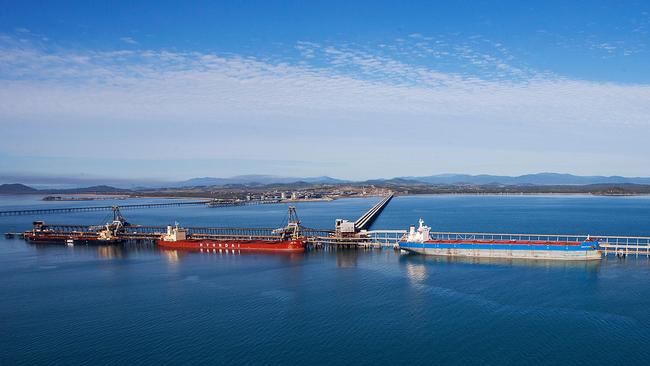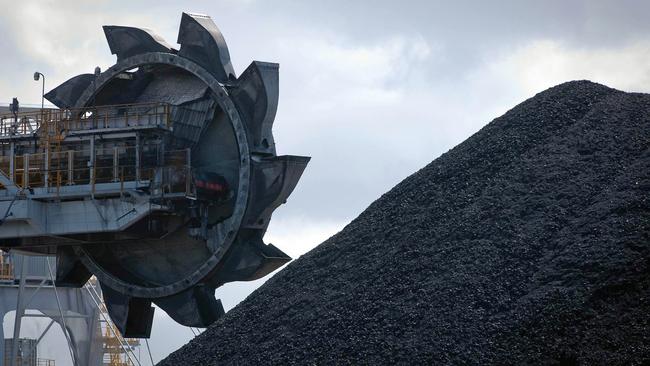Beijing ponders backflip on Australian coal ban
Shares in ASX-listed producers surge amid rising expectations China could lift unofficial ban on Australian coal exports.

Shares in ASX-listed coal producers surged on Thursday amid rising expectations that Chinese authorities will lift an unofficial ban on Australian coal exports.
While no official confirmation was available on Thursday, sources in the Chinese steel sector told The Australian that the speculation should be taken seriously, given growing pressure on Beijing from heavy industry that is suffering badly from high commodity prices in the absence of competition from Australian mines.
Another wave of Covid-19 infections has sapped domestic spending and confidence. The northwestern city of Lanzhou has been put into lockdown, while restrictions are tightening in Shanghai and around the country, triggered by cases of the infectious BA. 5 strand of the virus.
That has been compounded by spiking resource costs following Russia’s invasion of Ukraine.
One industry source in China said Beijing appeared to be eager to use the recent modest improvement in Australian-Chinese relations to end its ban on what was, until 2020, its biggest imported source of coal.
“No further information is out yet, but the trajectory is towards it,” they told The Australian.
Suggestions that the unofficial coal ban might be lifted were circulating on the social media accounts of self-described Chinese investors. They cited a local publication SXCoal.com, which in turn quoted market sources.
A separate research note by a Chinese commodity futures trading company said while it was uncertain whether China would end the ban, discussion of Australian coal was dominating conversations among local traders.
The reports were enough to cause a sharp spike in the share prices of local coal producers.
BHP shares rose 1.3 per cent to $37.40, while Stanmore Resources closed up 4.3 per cent at $1.93. New Hope shares rose 5.7 per cent to $4.25.
Despite no significant sales to China, Whitehaven Coal closed up 6.5 per cent at $5.74.
By comparison, the ASX 200 rose just 0.4 per cent.

Late on Thursday, Bloomberg reported that bureaucrats were studying the energy outlook and planned to recommend an end to the near two-year ban.
A possible end to the ban came as new figures showed Japan had displaced China as the biggest buyer of Australian LNG, with producers taking advantage of a global energy squeeze following Russia’s invasion of Ukraine.
Australian LNG exports surged to 82.6 million tonnes a year for the 12 months to June 30, consultants at EnergyQuest said, outstripping the prior record of 79.3 million tonnes in 2020. The exports were worth $70bn compared with $30bn a year earlier.
But Australian LNG exports to China were down 12 per cent for the year, to 25 million tonnes, EnergyQuest said, as Chinese buyers switched to Qatar and US sources of LNG. Exports to Japan for the financial year lifted slightly to 26.7 million tonnes.
Australian coal producers and traders contacted by The Australian said they had no direct knowledge of any moves afoot to relax the bans, and multiple sources said local miners were likely to approach any relaxation with extreme caution, given it could be reversed at any time.
China has never officially stopped the import of Australian coal, but restrictions put in place in 2020 left millions of tonnes of thermal and metallurgical coal sitting off major Chinese ports.
Even though most local producers take payment for coal at the port, meaning that Chinese buyers and traders wore the losses on the stranded coal, Beijing’s bans sent the price of Australian coal tumbling to near record lows, causing huge losses for major producers. But global trade flows quickly reorganised around the bans, and by late 2021 – as an energy crisis in the northern winter gathered pace, and the Chinese steel industry recovered strongly from the initial impact of Covid-19 – coal prices had recovered strongly.
Prices for both coking and thermal coal have hit records this year, on the back of international bans on Russian exports in the wake of Vladimir Putin’s invasion of Ukraine. And, in the absence of cheap, high-quality Australian coking coal, Chinese steel mills were the major victim of Beijing’s bans, paying a substantial premium for US, Canadian and Russian coal instead.
A research note published by Beijing Fuhua, which does consulting work for the steel industry, said that the ban on Australian coking coal had led to much higher prices in China.
The China-based analysts said they expected that Australian coking coal would be allowed back into the market ahead of the 50th anniversary of the establishment of diplomatic relations between China and Australia in December.
“There are obvious signs of recovery in the relationship,” the Beijing Fuhua researchers said in a note published on Wednesday.
The ban on coking coal surprised Australian officials because of its importance to the Chinese steel industry, the world’s biggest.
The politically motivated ban has been unpopular with many in the Chinese steel industry, whose margins were squeezed in much of 2020 and 2021 by soaring iron ore prices. That iron ore price surge undermined Beijing’s trade coercion campaign, with exports to China setting new records despite the bans in relatively smaller industries, including wine, barley, lobsters and timber.
Any relaxation of the bans is likely to apply to coking coal rather than thermal coal.
Even if Beijing relaxes its shadow bans, local coal industry sources told The Australian on Thursday they believed Australian producers would treat approaches by Chinese buyers with caution, for fear of a quick reversal if relationships between Beijing and Canberra again soured.
Spot sales are likely if Chinese buyers offer a big premium, sources say, but with European buyers lining up ahead of the next northern winter – amid the threat Russia will shut off gas supplies – few Australian producers would be in a rush to sign contracts in China when other options exist.


To join the conversation, please log in. Don't have an account? Register
Join the conversation, you are commenting as Logout